One thing people love about ducks is their ability to swim, fly, run, and walk. However, when ducks fly, their owners can worry because the ducks can lose their way back home.
Can you keep ducks from flying away? Are there certain duck breeds can (or can’t) fly that might be a better fit for your needs?
You can prevent ducks from flying away by making them feel safe at home. If you are still worried about your duck’s ability to fly, you can carefully clip their wings to prevent them from flying.
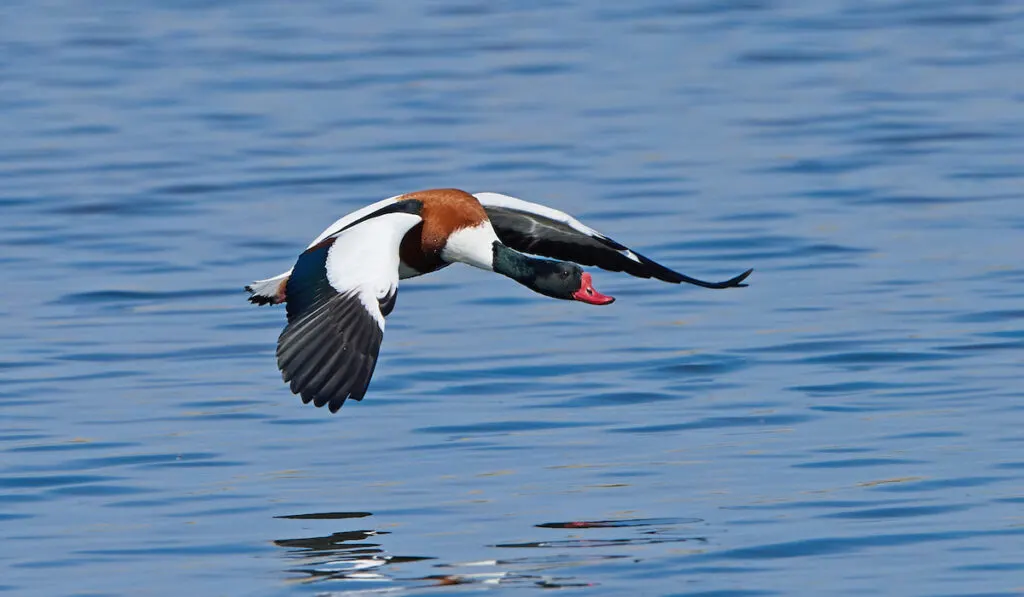
It’s important to understand when and why ducks will fly away and the safe, ethical ways that you can prevent them from getting lost or flying off accidentally.
Table of Contents
Why and How Ducks Fly Away
It is very common for people to search for their lost ducks. They can easily become lost if they fly too far away and cannot find their way home.
If you are worried about your animals or trying to choose the right ducks for your needs, here are some factors to consider.
Can Your Duck Fly?
Not every duck breed can fly. Before buying any duck breed, it is important to know whether or not you are purchasing a flying breed.
Some popular duck breeds that can fly are:
- Call
- Muscovy
- Campbell
- Mandarin
- East Indies
- Bantam Hybrids
- Welsh Harlequin
- Australian Spotted
- Miniature Silver Appleyards
- All wild and game breeds, such as Mallards
Some duck breeds that you do not have to worry about flying away include:
- Pekin
- Rouen
- Saxony
- Cayuga
- Magpie
- Swedish
- Runners
- Aylesbury
- Buff Orpington
- Silver Appleyard
Why do most popular domestic breeds of ducks lack the ability to fly? Breeders look to encourage more favorable characteristics in ducks.
Most people want ducks that grow fast and produce quality meat. The more ducks are bred for meat production, the fewer ducks will be able to fly because producing more meat means gaining extra weight.
Heavy birds such as chickens, ducks, and ostriches cannot fly.
Why Do Ducks Fly Away?
There are many reasons why ducks fly away. Here are a few popular reasons why your duck may take off:
1. Escaping Predators
If the area is not secure and there are predators such as foxes nearby, your ducks may fly to escape the predators. In the fear of the moment, they might fly far to get away from the threat and get lost.
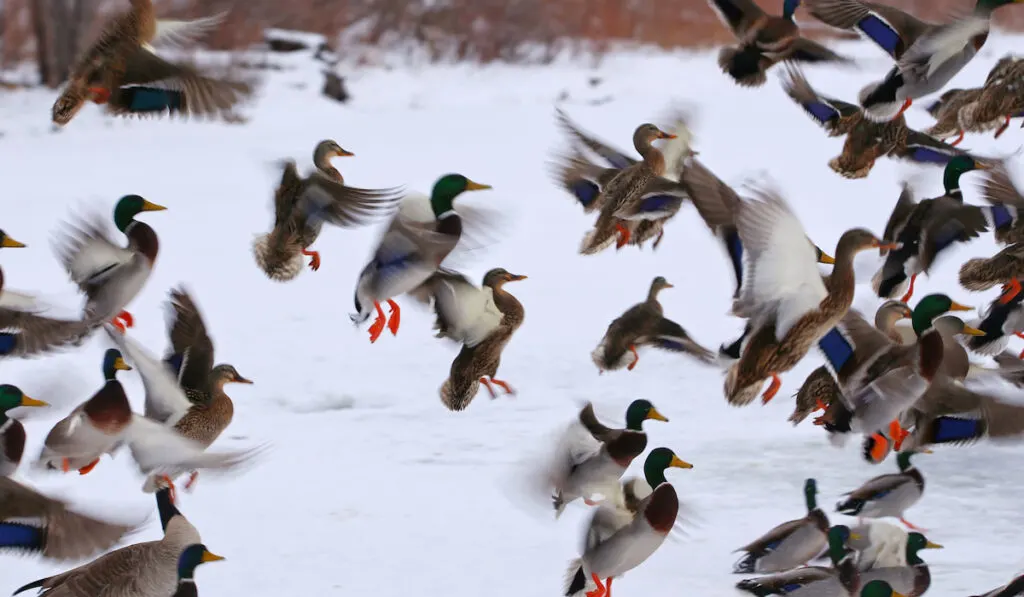
2. Looking for Food
Ducks will go in search of food if they are not properly fed. If they cannot find food in your backyard, pen, or housing you provide for them, they will go off in search of food.
Again, if they get too carried away, they might get lost and be unable to return home.
3. Playing
Ducks will take to flying when playing or feeling very excited. When they play with each other, they are happy but also distracted. However, while your ducks might fly around when excited, they are not likely to fly too far or get lost.
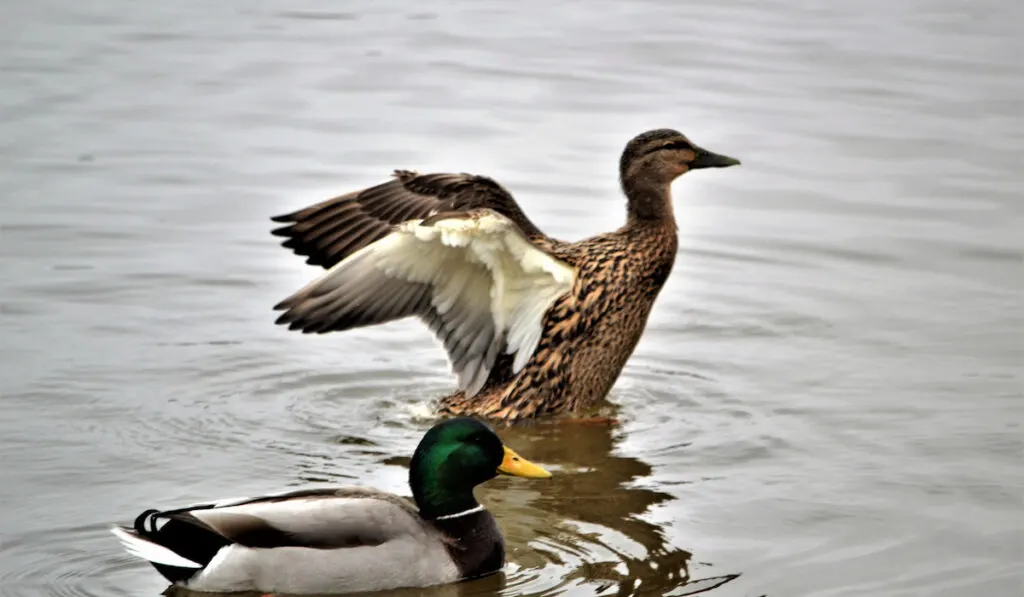
4. Moving on If Tamed
Tamed animals are those that are typically wild but have been trained to become domestic. Tamed ducks may give into their instincts or past behavior and fly away.
This is more likely to happen if you stop providing the incentives, like food and shelter, that helped lead to their taming in the first place.
5. Following Instinct
For duck breeds that are able to fly, taking flight comes naturally and is an instinct.
Just like swimming, flying is a normal activity for ducks and many fly around simply because they are able to.
Should You Allow Your Ducks to Fly?
Whether you let your ducks fly can depend on your specific situation and needs.
Some people keep ducks because they love to see their birds flying. Other people cannot take the risk of allowing their birds to fly because of their investment.
What is certain is that not every duck that is capable of flying will actually fly away or get lost.
Most people who decide to prevent their ducks from flying do so because they have once lost a duck or know someone who has.
5 Safe and Ethical Ways to Keep Ducks From Flying Away
Here are a few practical ways to prevent your ducks from flying too far away while keeping the focus on their safety and health.
1. Clip Their Wings
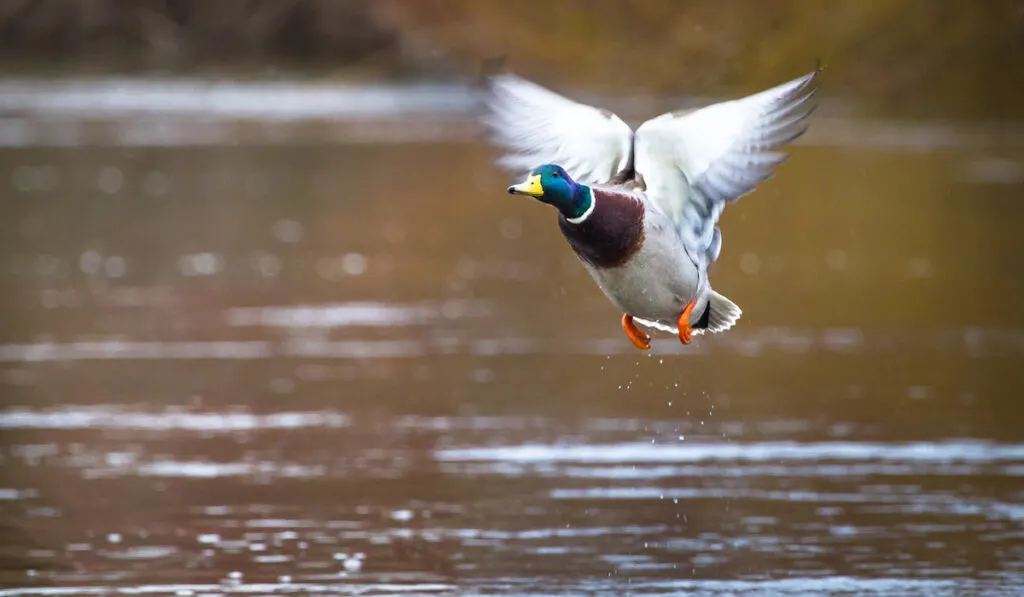
This is the most common method for preventing ducks from flying away. Note that you do not have to clip both wings.
Clipping just one wing is just as effective as clipping both wings. Without one wing working as effectively as the other, ducks cannot gain balance while flying.
Follow these steps to clip your duck’s wing:
- Raise the preferred wing.
- Identify the flight feathers which are usually the longest and closest to the outer edges.
- Clip the flight feathers at mid-point Do not clip too close to the wing or too close to their edges.
While this process is rather easy, keep these tips in mind:
- Clipping to close to the wing can cause pain and bleeding because blood vessels are in that region.
- Clipping too close to the edges of the flight feathers will not prevent the duck from flying.
- Do not shave off other feathers because they have other functions such as beauty and insulation.
2. Tie Something Heavy to a Wing
You can use a zip tie to attach a small but heavy weight, such as a metal washer, to the duck’s wing. This will prevent your duck from gaining equilibrium, or balance, that is needed to fly effectively.
Be sure to only tie the item to the wing, and do not use any materials that can harm the animal.
3. Feed Them Often and Train Them to Return
The more feed you provide, the more willing your ducks will be to stay with you.
You can train your ducks to return to their coop with the following steps:
- As soon as they are out of their brooder, give them special treats every evening in their coop.
- As your ducks mature, reduce the rate of giving them treats and only do so in the evening when they return. This reinforces the return behavior.
- For a few weeks, reward your ducks when they return to their coop in the evening. Only reward ducks that come early. Do not give them treats every day.
4. Secure the Area
Removing the fear of threat can help your ducks feel more comfortable and less likely to take off. This is especially important if there are predators in your area.
Take measures to ensure that the ducks coop and general habitat are secure with fences or other deterrents to keep predators out and to encourage your ducks to stay.
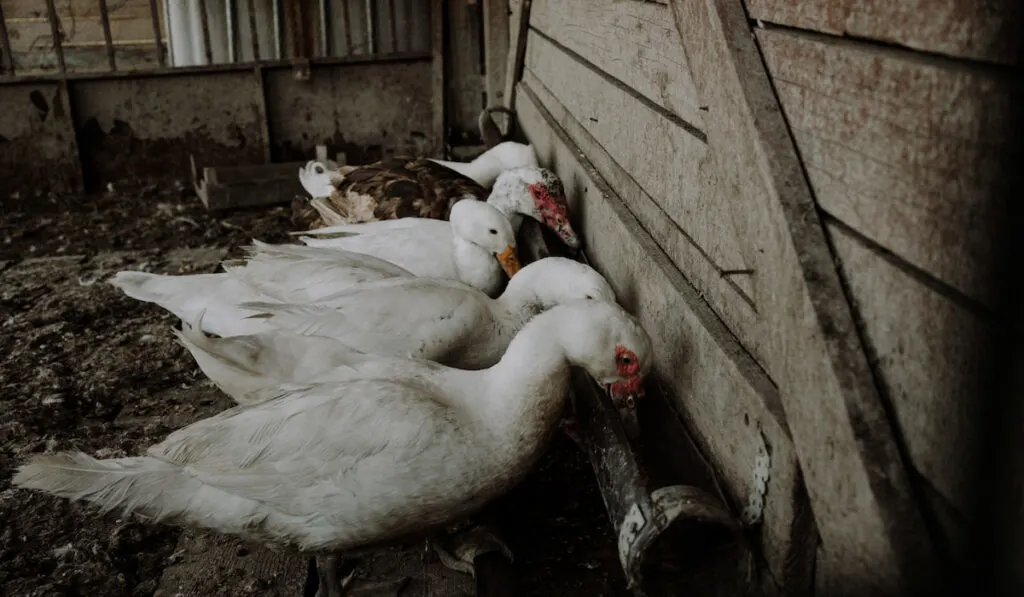
5. Bond With Your Ducks
Bonding with your ducks is an effective way of keeping them from flying away. Ducks are more likely to stay where they feel safe and engaged with. They also learn who is responsible for their care and feed.
You can bond with your ducks by cuddling them, giving them treats, and spending time with them. While this takes some effort, building the bond can help keep the animals safe in the long run.
Final Thoughts
The most common want to keep your ducks from flying away is by clipping their wings. Just be sure to do this safely and properly.
You can also attach something heavy to a wing or spending time bonding with your ducks. The goal is to encourage your animals to stay where it is safe and prevent them from flying off too far where they can become lost.
Resources
- http://www.cornerstonefarm.net/wingdemo.html
- https://www.raising-ducks.com/clipping-a-ducks-wings/
- https://www.efowl.com/will-my-pet-ducks-fly-away/
- https://www.omlet.co.uk/guide/ducks/duck_health/wing_clipping
- https://www.backyardchickens.com/threads/how-to-stop-my-ducks-from-flying-away.1022676/
- https://www.quora.com/Do-domestic-ducks-fly-away-and-what-kind-of-duck-breeds-can-be-domesticated
